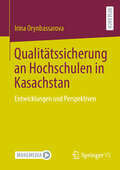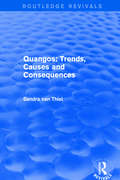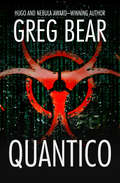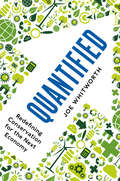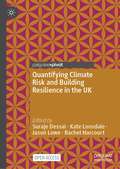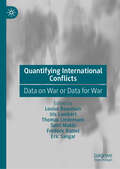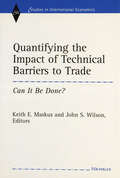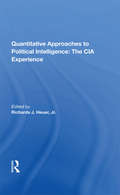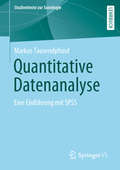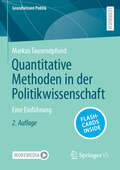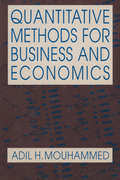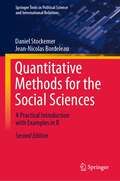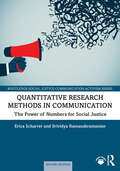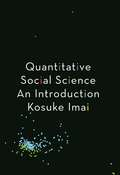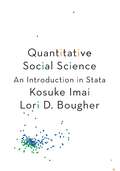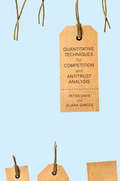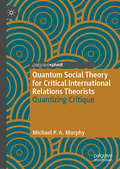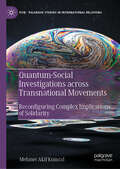- Table View
- List View
Qualitätssicherung an Hochschulen in Kasachstan: Entwicklungen und Perspektiven
by Irina OrynbassarovaDas vorliegende Buch setzt sich mit der Qualitätssicherung und dem -management an kasachischen Hochschulen seit der Verselbstständigung des Bildungssystems nach dem Zerfall der Sowjetunion auseinander. Das Ziel der Arbeit ist die intendierten und nicht-intendierten Effekte der ISO-Normen zu analysieren und die Faktoren, die zur Angleichung des QMS an kasachischen Hochschulen geführt haben sollen, zu identifizieren. Die Autorin stellt außerdem die historische Entwicklung des Hochschulwesens und die Reformen, die seit der Verselbstständigung im Gang sind, dar.
Quand la vérité fait mal: mentir pour être gentil
by Bella DepauloDe la spécialiste de la supercherie, Bella DePaulo: Que se passe-t-il lorsque les gens veulent être honnêtes, mais s'ils disent la vérité, cela nuira aux sentiments des autres? Quand la vérité fait mal: mentir pour être gentil La plupart des gens apprécient l'honnêteté. Ils veulent dire la vérité. Ils apprécient également la gentillesse. Parfois, cependant, l'honnêteté et la gentillesse se heurtent. Cela arrive quand dire la vérité serait blessant, mais être gentil implique de mentir. Comment les gens négocient-ils ce choc des nobles intentions? Quand la vérité fait mal: mentir pour être gentil est un petit livre en deux parties. La partie 1 est adaptée de ce chapitre: DePaulo, Bella M., Morris, Wendy L. et Sternglanz, R. Weylin (2009). Quand la vérité fait mal: tromperie au nom de la gentillesse. Dans Anita L. Vangelisti (Ed.), Se sentir blessé dans les relations étroites (pp. 167-190). Cambridge: Cambridge University Press. Dans la partie 2, les questions que divers journalistes ont posées au professeur DePaulo au fil des ans sont rassemblées et répondues. La première partie a été écrite pour un public savant mais tout lecteur intelligent sera en mesure de la comprendre. La deuxième partie a été écrite pour un large public.
Quando A Verdade Dói: A Mentira Em Nome Da Gentileza
by Bella Depaulo Mayara LealA maioria das pessoas valorizam a honestidade. Elas querem dizer a verdade. E elas também valorizam a gentileza. Porém, às vezes, a honestidade e a gentileza colidem. Isso acontece quando dizer a verdade seria doloroso, mas ser gentil envolveria contar uma mentira. Como as pessoas lidam com esse conflito de nobres intenções? Quando a Verdade Dói: A Mentira em Nome da Gentileza é um livro com duas partes. Na primeira, vamos examinar os vários tipos de mentiras que as pessoas contam para poupar os sentimentos dos outros. Vamos explorar tanto as mentiras bondosas que as pessoas contam diariamente, sem muita premeditação ou desconforto, como as mentiras mais graves que as pessoas já contaram ou ouviram. Quando as pessoas têm de escolher entre a verdade e a gentileza, quais fatores fazem com que a balança penda mais para um sentido ou o outro? Você verá algumas respostas a essa pergunta e também as táticas que usamos quando queremos evitar magoar alguém sem contar uma mentira deslavada. Na parte dois, eu apresento uma compilação de questões relevantes para o tema deste livro que vários repórteres já me perguntaram ao longo dos anos, e então compartilho minhas respostas. Essa parte é dividida em três: A psicologia das mentiras pequenas Diferenças entre os sexos na mentira cotidiana Mentindo nos relacionamentos Compre este livro e descubra mais sobre o mundo das mentiras.
Quangos: Trends, Causes And Consequences
by Sandra van ThielThis title was first published in 2001. This sustained and rigorous theoretical treatment of the choices made by politicians regarding quasi-autonomous non-governmental organizations (quangos) makes compelling reading for both practitioners and academics alike.
Quantico (Quantico #1)
by Greg BearThe Dome of the Rock in Jerusalem has been blown to bits by extremists, and, in retaliation, thousands have died in another major attack on the United States. Now the FBI has been dispatched to deal with a new menace. A plague targeted to ethnic groups--Jews or Muslims or both--has the potential to wipe out entire populations. But the FBI itself is under political assault. There's a good chance agents William Griffin, Fouad Al-Husam, and Jane Rowland will be part of the last class at Quantico. As the young agents hunt a brilliant homegrown terrorist, they join forces with veteran bio-terror expert Rebecca Rose. But the plot they uncover--and the man they chase--prove to be far more complex than anyone expects.
Quantified
by Joe WhitworthGoogle, Apple, Amazon, Uber: companies like these have come to embody innovation, efficiency, and success. How often is the environmental movement characterized in the same terms? Sadly, conservation is frequently seen as a losing battle, waged by well-meaning, but ultimately ineffective idealists. Joe Whitworth argues it doesn't have to be this way. In fact, it can't be this way if we are to maintain our economy, let alone our health or the planet's. In Quantified, Whitworth draws lessons from the world's most tech-savvy, high-impact organizations to show how we can make real gains for the environment. The principles of his approach, dubbed quantified conservation, will be familiar to any thriving entrepreneur: situational awareness, bold outcomes, innovation and technology, data and analytics, and gain-focused investment. This no-nonsense strategy builds on the inspirational environmental work begun in the 1970s, while recognizing that the next economy will demand new solutions. As President of The Freshwater Trust, Whitworth has put quantified conservation into practice, pioneering the model of a "do-tank" that is dramatically changing how rivers can get restored across the United States. The stories in Quantified highlight the most precious of resources--water--but they apply to any environmental effort. Whether in the realm of policy, agriculture, business, or philanthropy, Whitworth is charting a new course for conservation.
Quantified: Redefining Conservation for the Next Economy
by Joe S. WhitworthGoogle, Apple, Amazon, Uber: companies like these have come to embody innovation, efficiency, and success. How often is the environmental movement characterized in the same terms? Sadly, conservation is frequently seen as a losing battle, waged by well-meaning, but ultimately ineffective idealists. Joe Whitworth argues it doesn't have to be this way. In fact, it can't be this way if we are to maintain our economy, let alone our health or the planet's. In Quantified, Whitworth draws lessons from the world's most tech-savvy, high-impact organizations to show how we can make real gains for the environment. The principles of his approach, dubbed quantified conservation, will be familiar to any thriving entrepreneur: situational awareness, bold outcomes, innovation and technology, data and analytics, and gain-focused investment. This no-nonsense strategy builds on the inspirational environmental work begun in the 1970s, while recognizing that the next economy will demand new solutions. As President of The Freshwater Trust, Whitworth has put quantified conservation into practice, pioneering the model of a "do-tank" that is dramatically changing how rivers can get restored across the United States. The stories in Quantified highlight the most precious of resources--water--but they apply to any environmental effort. Whether in the realm of policy, agriculture, business, or philanthropy, Whitworth is charting a new course for conservation.
Quantifying Climate Risk and Building Resilience in the UK
by Jason Lowe Suraje Dessai Kate Lonsdale Rachel HarcourtThis open access book draws together key research from the UK Climate Resilience programme. It focuses on topics central to the programme’s research agenda, including improved characterisation and quantification of climate risks, enhanced understanding of the management of climate risks, and the development and delivery of climate services. Key chapters address the challenges inherent to undertaking resilience research, including how to make the term ‘climate resilience’ usable and useful, co-producing research between academics, policy makers and practitioners, and engaging and communicating outside of academia. This book is unique in providing a concise and accessible overview of the programme’s key lessons, placing the findings into a wider context and it will inform future research, policy and practice agendas.
Quantifying International Conflicts: Data on War or Data for War
by Thomas Lindemann Eric Sangar Frédéric Ramel Louise Beaumais Iris Lambert Sami MakkiBased on the Datawar research program developed by three French academic institutions, this book seeks to explore the following research question: how do social practices of data collection and analysis in quantitative conflict studies influence researchers’ and practitioners’ representations of armed conflict? The editors and authors investigate both scientific practices in the field of quantitative conflict studies and the impact of these practices on practitioners’ vision of war, covering the full lifecycle of quantitative conflict data, from collection and analysis to their use and dissemination by military and diplomatic institutions, humanitarian organizations, and the media.
Quantifying the Impact of Technical Barriers to Trade: Can It Be Done? (Studies In International Economics)
by Keith E. Maskus John S. WilsonThis book provides an up-to-date discussion of economic issues involved in analyzing regulations of product quality and performance in international trade. Among the issues addressed in this collection are restrictions on genetically modified foods and pesticide use and compatibility standards for computers. While such regulations may serve important goals, they may also interfere with international trade flow by raising the costs of compliance. This is of special concern to developing countries, which have found it difficult to meet the increasingly exacting regulations imposed by the United States and Europe. Keith E. Maskus and John S. Wilson gather prominent international trade specialists to ask whether the impacts of such regulations may be quantified systematically in order to inform the international policy debate. The essays included here cover all fronts of the debate over regulatory issues and trade conflicts. The discussion ranges from a review of how trade conflicts emerge and how they are managed by the international trading system to a technical analysis of the potential impact of European restraints on trade in genetically modified products to an examination of methods for estimating the costs of compliance with environmental regulations. Considerable attention is paid to whether the emergence and enforcement of stronger standards among developed economies could result in diminished trade opportunities for developing countries. At the same time, the possibility that standards could expand market access through resolving consumer information problems is analyzed. This book will appeal to international economists, international relations specialists, and individuals concerned about appropriate regulation of safety and health issues in the global economy. Keith E. Maskus is Professor of Economics, University of Colorado, Boulder. John S. Wilson is Lead Economist, Development Economics Research Group, The World Bank.
Quantitative Approaches To Political Intelligence: The CIA Experience
by Richards HeuerBridging the gap between the scientific approach to international relations and the intuitive analysis of the government foreign affairs specialist, this book reports on a concerted effort by the CIA to apply modern social science methods to problems confronted by political intelligence analysts. The unique experience gained through this CIA progra
Quantitative Datenanalyse: Eine Einführung mit SPSS (Studientexte zur Soziologie)
by Markus TausendpfundDas Buch bietet eine Einführung in die quantitative Datenanalyse mit dem Statistikprogramm SPSS. Es werden Kenntnisse vermittelt, um einfache Analysen selbstständig durchführen zu können. Dazu gehören der Download von Sekundärdatensätzen, die sachgemäße Kodierung von Variablen (Datenaufbereitung), die uni- und bivariate Datenanalyse sowie multivariate Analyseverfahren. Für eine möglichst praxisnahe Darstellung werden die einzelnen Analysen auf Basis der ALLBUS-Daten 2014 illustriert. Dabei werden die zentralen Befehle (Syntax) vorgestellt, die für die Datenanalyse mit SPSS erforderlich sind.
Quantitative Easing and Its Impact in the US, Japan, the UK and Europe
by Kjell Hausken Mthuli NcubeThis volume empirically analyzes the effects of quantitative easing (QE) on interest rates and the economy in the US, Japan, UK and Europe. Using an event-study methodology, the authors find that the measures undertaken by the Federal Reserve and Bank of England, which focus primarily on bond purchases, are much more effective in lowering interest rates than those undertaken by the Bank of Japan and the European Central Bank, which have relied more heavily on lending to private financial institutions. Using large Bayesian vector autoregression (BVAR) models they also analyze the impact of QE on the wider economy. They produce no-QE counterfactual forecasts that are compared with their corresponding baseline forecasts, incorporating the effects of QE on government bond spreads. Despite the failure of stimulating economic activities as a whole, the simulation results suggest that the unconventional monetary policies have a positive influence on industrial production in the US, UK and Japan. The authors' analysis finds that QE contributes to the reduction in unemployment in the US and Japan, and a rise in inflation-expectations in the US, UK and Euro zone. However, evidence on QE's effect on house prices, stock prices, consumer confidence, and exchange rate, is mixed and thus inconclusive.
Quantitative Methoden in der Politikwissenschaft: Eine Einführung (Grundwissen Politik)
by Markus TausendpfundDieses Lehrbuch bietet eine Einführung in die sozialwissenschaftliche Forschungslogik und den quantitativen Forschungsprozess. Die einzelnen Phasen des Forschungsprozesses – Forschungsthema und Entwicklung einer Forschungsfrage, Konzeptspezifikation, Hypothesenbildung, Operationalisierung, Forschungsdesign, Auswahlverfahren und Datenerhebung – werden anhand politikwissenschaftlicher Beispiele dargestellt und erläutert. Zudem werden wichtige sozialwissenschaftliche Datensätze vorgestellt und die Bedeutung der Sekundäranalyse herausgearbeitet. Es bietet damit zentrale Informationen, die für ein Verständnis der quantitativen Sozialforschung und die Auseinandersetzung mit empirischen Studien erforderlich sind. Für die 2. Auflage wurde das Buch aktualisiert und überarbeitet.
Quantitative Methods for Business and Economics
by Adil H. MouhammedThis book provides a brief yet rigorous introduction to various quantitative methods used in economic decision-making. It has no prerequisites other than high school algebra. The book begins with matrix algebra and calculus, which are then used in the book's core modes. Once the reader grasps matrix theory and calculus, the quantitative models can be understood easily, and for each model there are many solved examples related to business and economic applications.
Quantitative Methods for the Social Sciences: A Practical Introduction with Examples in R (Springer Texts in Political Science and International Relations)
by Daniel Stockemer Jean-Nicolas BordeleauThis textbook offers an essential introduction to survey research and quantitative methods with clear instructions on how to conduct statistical tests with R. Building on the premise that we need to teach statistical methods in a holistic and practical format, the book guides students through the four main elements of survey research and quantitative analysis: (1) the importance of survey research, (2) preparing a survey, (3) conducting a survey and (4) analyzing a survey. In detail, students will learn how to create their own questionnaire on the basis of formulating hypotheses; sampling participants; disseminating their questionnaire; creating datasets; and analyzing their data. The data analytical sections of this revised and extended edition explain the theory, rationale and mathematical foundations of relevant bivariate and multi-variate statistical tests. These include the T-test, F-test, Chi-square test and correlation analyses, as well as bivariate and multivariate regression analyses. In addition, the book offers a brief introduction to statistical computing with R, which includes clear instructions on how to conduct these statistical tests in R. Given the breadth of its coverage, the textbook is suitable for introductory statistics, survey research and quantitative methods classes in the social sciences.
Quantitative Research Methods in Communication: The Power of Numbers for Social Justice (Routledge Social Justice Communication Activism Series)
by Erica Scharrer Srividya RamasubramanianThis fully updated second edition offers an advanced introduction to quantitative methods that focuses on why and how to conduct research that contributes to social justice.Providing both inspiration and step-by-step guidance on how to conceive, design, and carry out a quantitative study, the book shows how research can be used to work toward a more just and equitable world. The authors provide a detailed guide to quantitative methods and statistical analysis, showing how researchers can engage with social justice issues in systematic, rigorous, ethical, and meaningful ways. This new edition includes a new chapter on writing literature reviews and better aligns with the stages of quantitative research as well as the changing technologies that are available for researchers to both study and use in their work. It includes updated real-world case studies, interviews with scholar-activists, and definitions of key concepts as well as a deeper focus on ethics, social media, computational social sciences, data analytics, and data visualization techniques.Attuned to questions of access, equity, justice, diversity, and inclusion, this textbook is ideal for graduate and advanced undergraduate courses in research methods for communication and the social sciences. It will also be of interest to researchers who wish to engage with the transformation of structures, practices, and understandings in society through community and civic engagement and policy formation.Online resources for instructors include a test bank, PowerPoint slides, sample dataset, and YouTube tutorials. They are available online at www.routledge.com/9781032599878.
Quantitative Social Science: An Introduction
by Kosuke ImaiAn introductory textbook on data analysis and statistics written especially for students in the social sciences and allied fieldsQuantitative analysis is an increasingly essential skill for social science research, yet students in the social sciences and related areas typically receive little training in it—or if they do, they usually end up in statistics classes that offer few insights into their field. This textbook is a practical introduction to data analysis and statistics written especially for undergraduates and beginning graduate students in the social sciences and allied fields, such as economics, sociology, public policy, and data science.Quantitative Social Science engages directly with empirical analysis, showing students how to analyze data using the R programming language and to interpret the results—it encourages hands-on learning, not paper-and-pencil statistics. More than forty data sets taken directly from leading quantitative social science research illustrate how data analysis can be used to answer important questions about society and human behavior.Proven in the classroom, this one-of-a-kind textbook features numerous additional data analysis exercises and interactive R programming exercises, and also comes with supplementary teaching materials for instructors.Written especially for students in the social sciences and allied fields, including economics, sociology, public policy, and data scienceProvides hands-on instruction using R programming, not paper-and-pencil statisticsIncludes more than forty data sets from actual research for students to test their skills onCovers data analysis concepts such as causality, measurement, and prediction, as well as probability and statistical toolsFeatures a wealth of supplementary exercises, including additional data analysis exercises and interactive programming exercisesOffers a solid foundation for further studyComes with additional course materials online, including notes, sample code, exercises and problem sets with solutions, and lecture slidesLooking for a more accessible introduction? Consider Data Analysis for Social Science by Elena Llaudet and Kosuke Imai, which teaches from scratch and step-by-step the fundamentals of survey research, predictive models, and causal inference. It covers descriptive statistics, the difference-in-means estimator, simple linear regression, and multiple linear regression.
Quantitative Social Science: An Introduction in Stata
by Kosuke Imai Lori D. BougherThe Stata edition of the groundbreaking textbook on data analysis and statistics for the social sciences and allied fieldsQuantitative analysis is an increasingly essential skill for social science research, yet students in the social sciences and related areas typically receive little training in it—or if they do, they usually end up in statistics classes that offer few insights into their field. This textbook is a practical introduction to data analysis and statistics written especially for undergraduates and beginning graduate students in the social sciences and allied fields, such as business, economics, education, political science, psychology, sociology, public policy, and data science.Quantitative Social Science engages directly with empirical analysis, showing students how to analyze data using the Stata statistical software and interpret the results—it emphasizes hands-on learning, not paper-and-pencil statistics. More than fifty data sets taken directly from leading quantitative social science research illustrate how data analysis can be used to answer important questions about society and human behavior.Proven in classrooms around the world, this one-of-a-kind textbook features numerous additional data analysis exercises, and also comes with supplementary teaching materials for instructors.Written especially for students in the social sciences and allied fields, including business, economics, education, psychology, political science, sociology, public policy, and data scienceProvides hands-on instruction using Stata, not paper-and-pencil statisticsIncludes more than fifty data sets from actual research for students to test their skills onCovers data analysis concepts such as causality, measurement, and prediction, as well as probability and statistical toolsFeatures a wealth of supplementary exercises, including additional data analysis exercises and interactive programming exercisesOffers a solid foundation for further studyComes with additional course materials online, including notes, sample code, exercises and problem sets with solutions, and lecture slides
Quantitative Techniques for Competition and Antitrust Analysis
by Peter Davis Eliana GarcésThis book combines practical guidance and theoretical background for analysts using empirical techniques in competition and antitrust investigations. Peter Davis and Eliana Garcés show how to integrate empirical methods, economic theory, and broad evidence about industry in order to provide high-quality, robust empirical work that is tailored to the nature and quality of data available and that can withstand expert and judicial scrutiny. Davis and Garcés describe the toolbox of empirical techniques currently available, explain how to establish the weight of pieces of empirical work, and make some new theoretical contributions. The book consistently evaluates empirical techniques in light of the challenge faced by competition analysts and academics--to provide evidence that can stand up to the review of experts and judges. The book's integrated approach will help analysts clarify the assumptions underlying pieces of empirical work, evaluate those assumptions in light of industry knowledge, and guide future work aimed at understanding whether the assumptions are valid. Throughout, Davis and Garcés work to expand the common ground between practitioners and academics.
Quantum Decision Theory and Complexity Modelling in Economics and Public Policy (New Economic Windows)
by Anirban Chakraborti Emmanuel Haven Sudip Patra Naresh SinghThis book is an outcome of the interdisciplinary conference held at OP Jindal Global University (Quantum Decision-making and Complexity modeling, and their possible applications in social sciences- economics, finance and public policy). The volume builds upon the emerging fields of Econophysics, Complexity theory and Quantum like modelling in cognition and social sciences, and their plausible applications in economics and public policy. There can be deep linkages between the micro, meso and macro scales at which these paradigms operate. In this data-driven age, greater amounts of information, along with the facility to harvest, sort and process said information, have permitted an expansion of the capability to study a society’s various factors to a degree of detail and inclusiveness that has never before been available to researchers. As a result, an increasing number of throughlines is being discovered, revealing heretofore unknown connections between various disciplines and enhancing the study of such societal tropes as finance, language, shared behavior, and many others. As the reader will see, with clearer understanding of the interconnectedness of society’s assorted parts comes a clearer understanding of the society as a whole. We have received critical thoughts from noted experts in social and natural sciences to explore possible interconnections. The editors of this book earnestly hope that the critical reviews presented in this volume will stimulate further scholarly interest, but also interest among policy practitioners for the purpose of exploring possibilities for creating a new paradigm for comprehending pressing issues of deep uncertainty and emergence in social dynamics.
Quantum Social Theory for Critical International Relations Theorists: Quantizing Critique (Palgrave Studies in International Relations)
by Michael P. MurphyThis book examines the crossroads of quantum and critical approaches to International Relations and argues that these approaches share a common project of uncovering complexity and uncertainty. The “quantum turn” in International Relations theory has produced a number of interesting insights into the complex ways in which our assumptions about the physics of the world around us can limit our understanding of social life. While critique is possible within a Newtonian social science, core assumptions of separability and determinism of classical physics impose limits on what is imaginable. The author argues that by adopting a quantum imaginary, social theory can move beyond its Newtonian limits, and explore two methods for quantizing conceptual models—translation and application. This book is the first introductory book to quantum social theory ideas specifically intended for an audience of critical International Relations.
Quantum Technologies and Military Strategy (Advanced Sciences and Technologies for Security Applications)
by Ajey LeleThis book is about the strategic relevance of quantum technologies. It debates the military-specific aspects of this technology. Various chapters of this book cohere around two specific themes. The first theme discusses the global pattern of ongoing civilian and military research on quantum computers, quantum cryptography, quantum communications and quantum internet. The second theme explicitly identifies the relevance of these technologies in the military domain and the possible nature of quantum technology-based weapons. This thread further debates on quantum (arms) race at a global level in general, and in the context of the USA and China, in particular. The book argues that the defence utility of these technologies is increasingly becoming obvious and is likely to change the nature of warfare in the future.
Quantum-Social Investigations across Transnational Movements: Reconfiguring Complex Implications of Solidarity (Palgrave Studies in International Relations)
by Mehmet Akif KumralThis book weaves theoretical-empirical threads beyond pragmatic philosophy, quantum cosmology and world affairs. It offers a “quantum-social” approach to inquire solidarity configurations among transnational movements. The first part of the book develops an integrative framework to foreground “quantum-type” features of social fields, virtual movements, and complex encounters. Quantum conceptual keys open new gates for macro-theorizing of “non-locality” and comprehending fields around cognate disciplines like psychology and sociology as well as international studies. Accordingly, emotional “indeterminacy” is found fundamental for understanding mesoscopic dynamics of virtual mobilizations. All along micro-layers, phenomena of “entanglement” mold multiple pathways for transversal solidarities. The empirical second part looks at how transnational solidarity springs emerge under “quantum-like” contexts of liberation/revolution-redemption/resistance movements. Emotional memories and affective imageries dynamically co-mingle across flowing fields and moving habitats of “1968-71” and “2008-11.” Affective waves and sentimental circulations shape sanctified-secularized constellations of altruisms and sacrifices through which solidarities spin.
Quarterlife
by Devika RegeOne of The New Yorker's Best Books of 2024'A fearless achievement' The New Yorker'Blazingly original . . . Fiercely intelligent . . . Rege is at the forefront of a new generation of authors' Vauhini Vara, author of The Immortal King RaoThe Bharat Party has come to power after an intensely divisive election. Naren, a jaded Wall Street consultant, is lured home to Mumbai by their promise of ' better days '. With him is Amanda, eager to escape her New England town by volunteering in a Muslim-majority slum. Inspired by them, Naren's charismatic brother Rohit sets out to explore his ancestral heritage in the countryside, where he falls in with the fiery young men who drive the Hindu nationalist machine.As they each come to grips with the new India, their journeys coalesce into a riveting milieu characterized by brutal debates and desires as fraught as they are compulsive. The result is an ever-widening chorus that feeds into a festive night when all of Mumbai is on the streets - and the simmering unrest erupts.Quarterlife is as sweeping as it is intimate. With profound empathy and insight, Devika Rege lays bare the roots of political belief in a time of reckoning for democracies worldwide - this is a brilliantly innovative work that tests the limits of what the novel can achieve.
